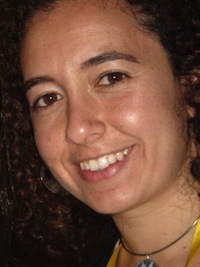
Robohub.org
035
Emergent communication with Sara Mitri and Jürgen Jost
In today’s episode we deal with the question of communication, what it means, where it comes from, and how it can be applied to robots. We first speak with Sara Mitri, whose research spans both robotics and evolutionary biology and tries to answer basic questions on how communication evolved many millennia ago using high-tech robotics of the 21st century. We then speak with Prof. Jürgen Jost who is director of two research groups a the Max Planck Institute for Mathematics in the Sciences. He’ll be giving us his thoughts on the intentionality of robot communication.
Sara Mitri
 Sara Mitri is a researcher working in collaboration with both the robotics-oriented Laboratory of Intelligent Systems, lead by Prof. Floreano at the EPFL in Switzerland and the biology-oriented Keller Group at the University of Lausanne. Mitri is studying communication and cooperation in social animals in an unconventional way. By using ground-based S-Bot robots to model biological agents, she hopes to be better able to control the various parameters of evolution than by using biological systems such as bacteria or insects.
Sara Mitri is a researcher working in collaboration with both the robotics-oriented Laboratory of Intelligent Systems, lead by Prof. Floreano at the EPFL in Switzerland and the biology-oriented Keller Group at the University of Lausanne. Mitri is studying communication and cooperation in social animals in an unconventional way. By using ground-based S-Bot robots to model biological agents, she hopes to be better able to control the various parameters of evolution than by using biological systems such as bacteria or insects.
Mitri’s recent articles in Current Biology and PNAS have been receiving a lot of media attention. Partly because of the resulting new scientific insights, but also because of the work’s unusual and powerful method. While retaining many of the real-world complexities present in biological systems, Mitri’s robotic models allow complete access to all model parameters. And there is another key advantage: Today very little is known about the evolution of phenomena like communication, because they leave no trace in the fossil record. By conducting artificial evolution, Mitri’s work allows to reconstruct part of that missing evolutionary history and shed light on the origins of communication in all animals, from simple cells to us humans.
Jürgen Jost
 Jürgen Jost works at the Max Planck Institute for Mathematics in the Sciences in Leipzip, Germany where he directs two research groups on Geometry, Analysis and Theoretical Physics and on Complex Structures in Biology and Cognition. As an expert in complex systems, Prof. Jost tells us about one of his interests, communication of all types. The Robots podcast had a chance to meet him at the European Conference on Complex Systems this year where he raised the question “Can Robots Communicate?” and is this communication intentional.
Jürgen Jost works at the Max Planck Institute for Mathematics in the Sciences in Leipzip, Germany where he directs two research groups on Geometry, Analysis and Theoretical Physics and on Complex Structures in Biology and Cognition. As an expert in complex systems, Prof. Jost tells us about one of his interests, communication of all types. The Robots podcast had a chance to meet him at the European Conference on Complex Systems this year where he raised the question “Can Robots Communicate?” and is this communication intentional.
Links:
- Download mp3 (20.7 MB)
- Subscribe to Robots using iTunes
- Subscribe to Robots using RSS
- Sara Mitri’s Homepage
- Laboratory of Intelligent Systems
- Keller Group
- Jürgen Jost’s Homepage
Latest News:
For impressive videos of Joules, the robotic tandem bike partner, the world’s first Robotic Bed and Boston Dynamic’s Precision Urban Hopper head over to the robotics forum!
View and post comments on this episode in the forum
tags: podcast




